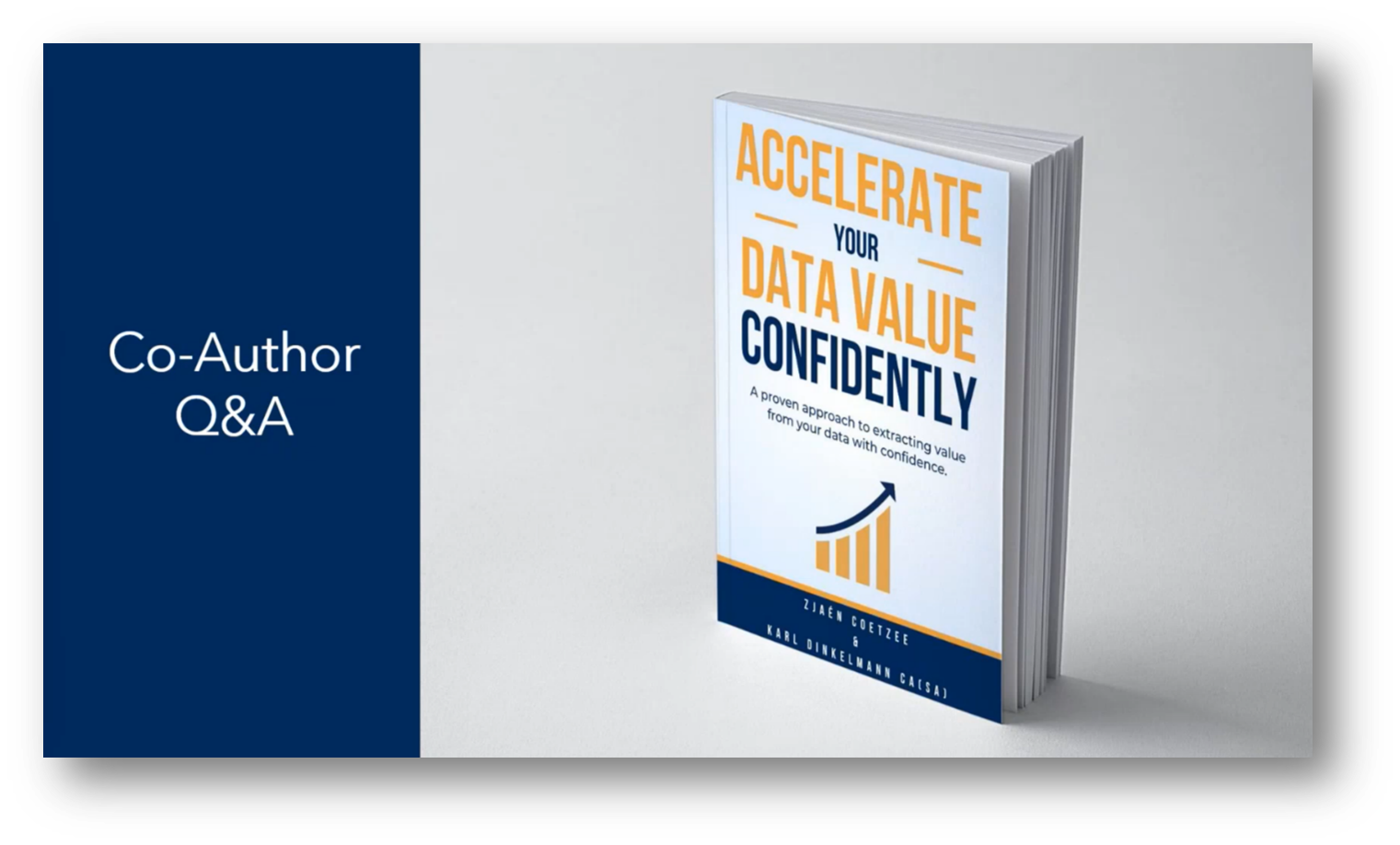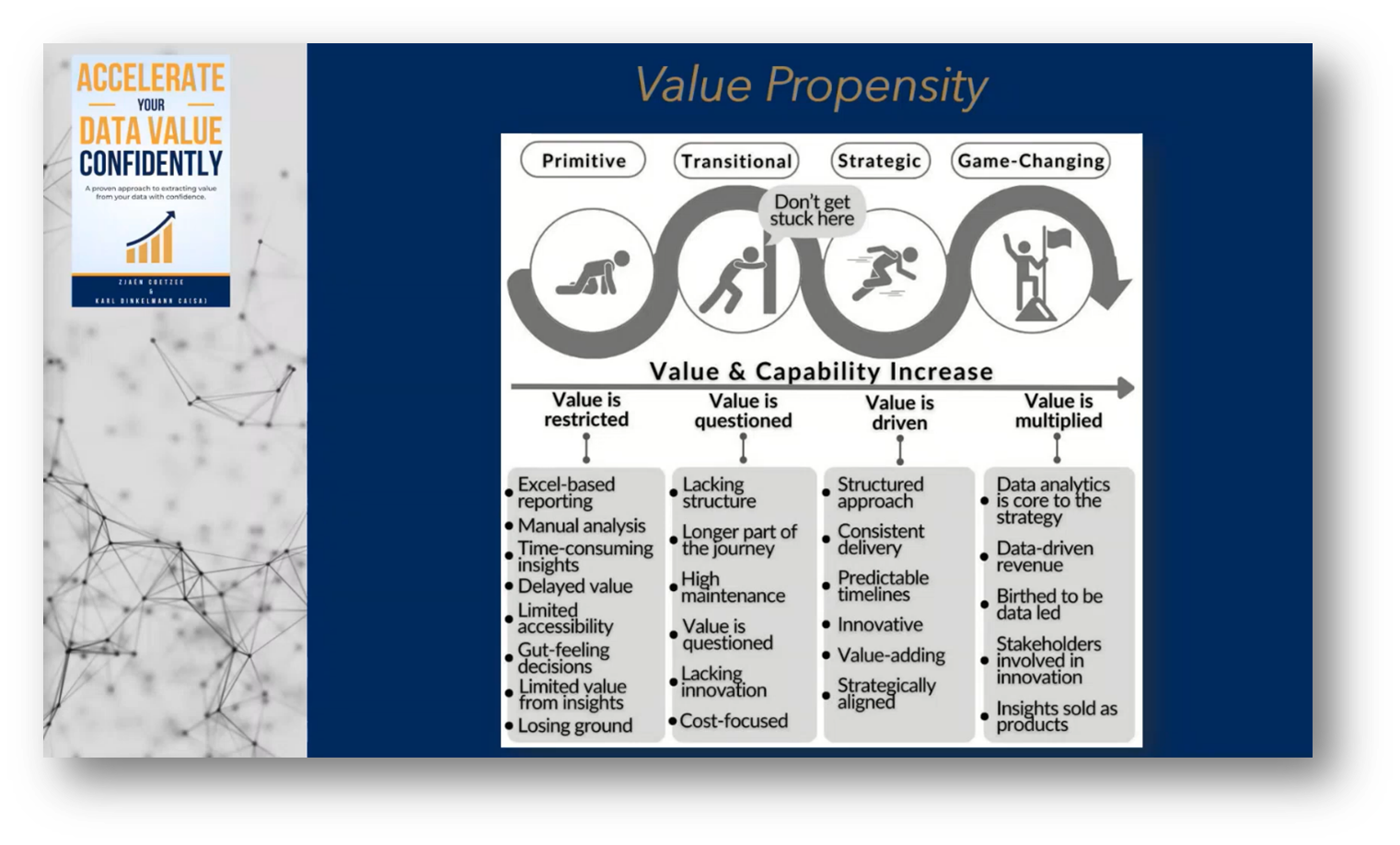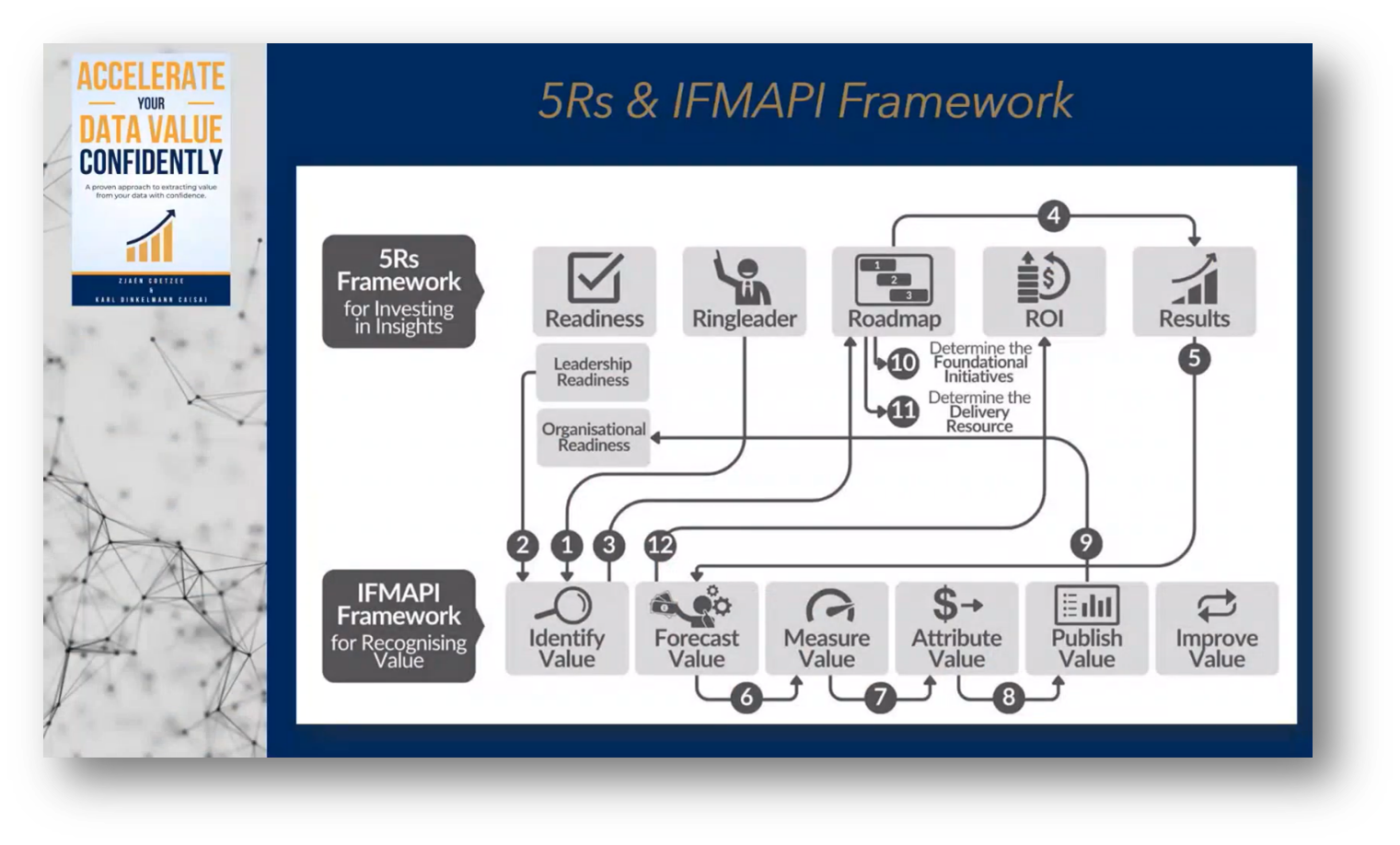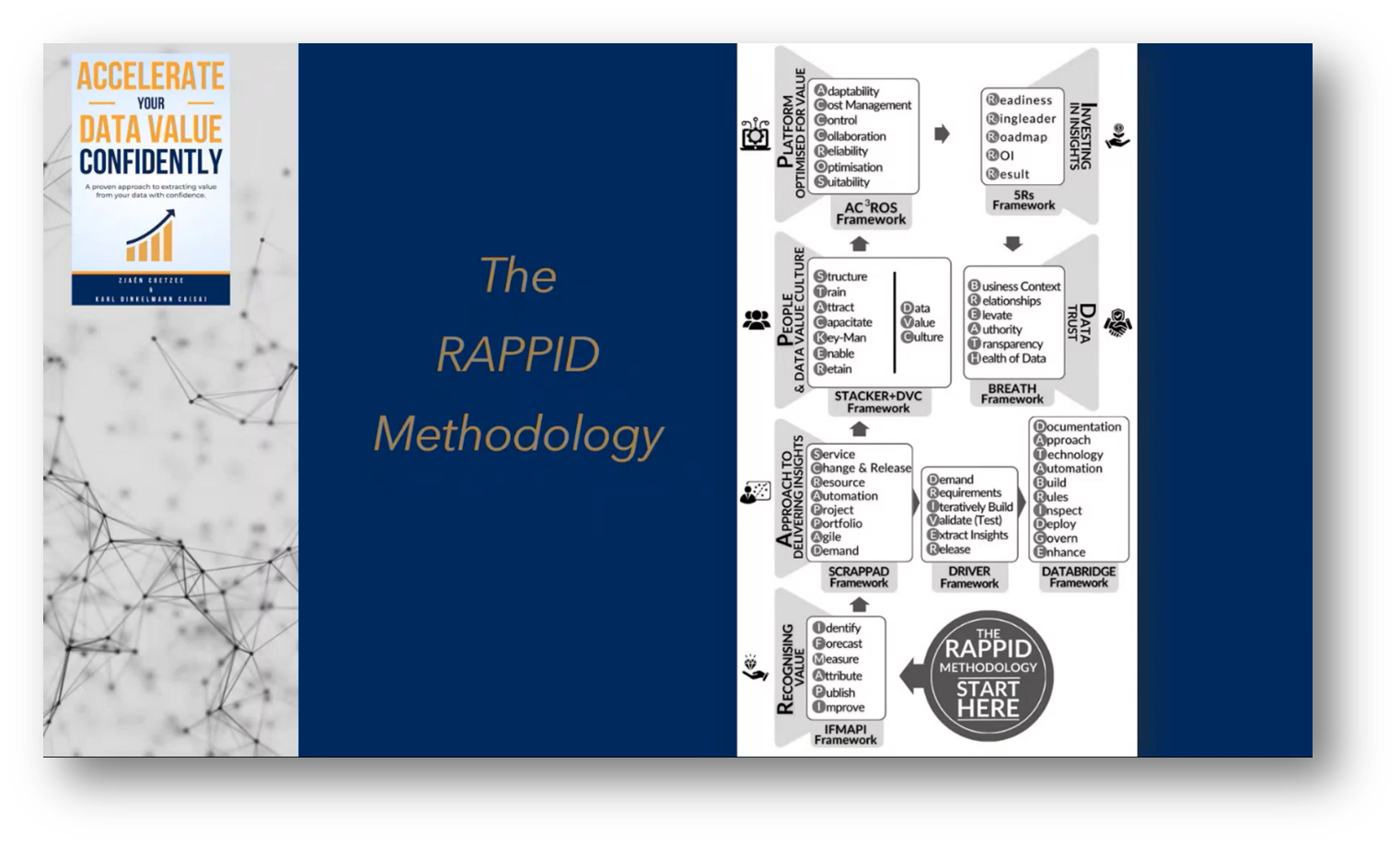Unleash the Power of your Data! Zjaen Coetzee and Karl Dinkelmann
Executive Summary
This webinar delves into the journey and significance of data analytics from its transitional to strategic stages, emphasising its pivotal role in both government and private sectors. Zjaen Coetzee and Karl Dinkelmann share in their book, which outlines the process for implementing data analytics in companies and advocates for embracing analytics. Additionally, the book underscores the importance of the relationship between the Chief Data and Analytics Officer (CDAO) and the Chief Financial Officer (CFO) in driving data analytics initiatives. The speakers address the critical need for data confidence and leadership in business. They introduce the RAPPID methodology and the Data Value Approach as frameworks for success. Furthermore, the role of Data Value Architects, the maturity and value of data in organisations, and the impact of data leadership on decision-making processes are all topics that are explored.
Webinar Details:
Title: Unleash the Power of your Data! Zjaen Coetzee and Karl Dinkelmann
Date: 22 May 2024
Presenter: Zjaen Coetzee and Karl Dinkelmann
Meetup Group: DAMA SA User Group
Write-up Author: Howard Diesel
Contents
Executive Summary
Webinar Details
Motivations and Challenges in Writing a Data-Driven Book
Journey of Data Analytics: From Transition to Strategic Stage
The Importance of Data Analytics in Business
Data Analytics in Government and Private Sectors
Process for Data Analytics in Companies
Embracing Analytics in Companies
The Importance of the Relationship between the CDAO and the CFO in Data Analytics
Understanding and Developing Data Confidence in Business Leaders
RAPPID Methodology and the Data Value Approach
Data Trust and Analytics in Business Context
The Role and Importance of Data Value Architect in Organization
Maturity and Value of Data in Organizations
The Importance of Data Confidence in Leadership
Data Leadership and Decision-Making in Business
Motivations and Challenges in Writing a Data-Driven Book
The webinar opens with the introduction of the authors Zjaen Coetzee and Karl Dinkelman. Both speakers have extensive experience in data strategy, business transformation, and data analytics consulting. They share their motivation for writing the book, focusing on the need to bridge the gap between data leaders and business executives in understanding the value of data. They aim to guide business leaders to leverage data and develop data-confident leaders within organisations effectively. Karl highlights the importance of valuing data based on future economic benefits, emphasising the intersection of financial studies and data expertise as the basis for the book.
Figure 1 Introduction to Q&A on Accelerate your Data Value Confidently
Figure 2 Value Propensity
Journey of Data Analytics: From Transition to Strategic Stage
The speakers discuss the importance of the relationship between analytics and organisations. They share that their book focuses on helping organisations progress from a primitive state to a strategic stage in data analytics. It highlights the challenges faced in the transitional stage and the value of reaching the strategic stage. Additionally, the book aims to provide insights and secrets to help organisations move through the transitional stage efficiently.
The Importance of Data Analytics in Business
The importance of leveraging data analytics for companies cannot be overstated. Understanding customer behaviour, identifying sales trends, managing stock levels, and gaining a competitive edge are just a few examples of how data analytics can add significant business value. Business leaders must overcome their hesitancy and lack of confidence to identify opportunities for generating value from data and analytics, ultimately building a roadmap for success. Companies that fail to embrace data analytics may find it increasingly challenging to compete effectively in today's competitive landscape.
Data Analytics in Government and Private Sectors
The speakers discuss the role of data analytics and technology in the government sector, particularly in response to the COVID-19 pandemic. They highlight the South African government's need to allocate limited resources effectively and make data-driven decisions. Government organisations are increasingly adopting a data-first mindset, which is demonstrated in hiring strong business leaders focusing on operational efficiency and cost reduction. The speakers emphasise the transformative value of data for government organisations and suggest that they are aligning with private organisations in prioritising data analytics and operational effectiveness.
Process for Data Analytics in Companies
Identifying opportunities to generate value through data analytics involves distinguishing between determinate and indeterminate value. Determinate value is measurable and impactful, such as increasing sales or retaining customers, while indeterminate value is difficult to measure, often involving complex data analysis. The recommended approach for companies is demand consolidation, which involves systematically identifying opportunities for value generation and prioritising them in collaboration with stakeholders. It's crucial for businesses to assess industry norms and competitors' strategies and to address challenges such as data literacy and resource management throughout the data analytics journey.
The analogy of organising a family trip illustrates the complexities of the data analytics journey. Like adding more families to a trip requires additional planning and resources, scaling data analytics efforts requires balancing foundational activities and value-generating initiatives. It is crucial to focus on the generated value and ensure that foundational disciplines support the overall roadmap without slowing down the initiative. Prioritising and allocating resources efficiently is essential for sustainable value generation, especially for organisations with limited resources. The approach should be akin to "just in time" to avoid unnecessary delays, governance issues, and potential frustration for the executive team.
Embracing Analytics in Companies
The main misconceptions, barriers, and challenges companies face when adopting analytics include the misconception that "quick and dirty" analytics is sustainable and scalable, the failure to plan for scale upfront, and the struggle to communicate the value of foundational elements such as data literacy. Focusing on aspects that truly add value rather than getting lost in buzzwords and fads is essential, as not everything adds value in the end. Additionally, overlooking the foundational elements can lead to chaos, multiple vendors, and outsourced teams, making it difficult to sustain and scale analytics efforts effectively.
Data leaders and business leaders face challenges around the pressure of keeping up with technology and buzzwords. The speakers emphasise the importance of delivering value in any technological or business decision. They share on the need for business leaders to ask the right questions when dealing with software vendors and the importance of data analytics leaders communicating effectively with business leaders. The discussion also highlights the significance of linking technology to strategic imperatives and understanding that delivering value doesn't always require complex technology but rather a deep understanding of the business's needs. Overall, data analytics professionals must develop business and finance literacy to better understand and address business challenges.
The Importance of the Relationship between the CDAO and the CFO in Data Analytics
The significance of the relationship between the Chief Data and Analytics Officer (CDAO) and the Chief Financial Officer (CFO) is emphasised. The trust and partnership between these two roles are vital for leveraging data as a strategic value driver. The speakers outline the challenges of aligning the goals of the CDAO and CFO, providing frameworks such as the "5Rs" and the "IFMAPI" framework to bridge the gap and enable confident investment in data initiatives. Building trust and understanding each other's language is crucial for successful collaboration between these two roles.
The IFMAPI framework can support a healthy relationship between the CDO, CFO, and CEO in the context of data analytics investments. It emphasises the need for mechanisms to report on the value generated and the significance of strong investment and business cases. The speakers touch upon the necessity of frameworks for business leaders, the role of a guiding coalition, and the challenges associated with weak business cases in the data space.
Figure 3 5Rs & IFMAPI Framework
Understanding and Developing Data Confidence in Business Leaders
The importance of data confidence in driving business value is highlighted. A data-confident business leader is expected to have confidence in the data they access and use it effectively to derive value for their business. Combining data and business requires a data-confident leader to push the organisation forward. An example is shared about Google's emphasis on data confidence, where every business leader was expected to implement machine learning and automation, and the lack of data confidence was not tolerated. Triple checks and extensive measures were taken to ensure reliable data analysis.
The speakers mention Google, emphasising the company's focus on data confidence machine learning and AI integration across all business functions. Google's culture of data obsession leads to its decisions being backed by extensive checks and measurements to mitigate biases. The speakers underscore the importance of developing data confidence among leaders at all levels, enabling them to make informed decisions based on data rather than gut feelings. This approach has contributed to Google's remarkable growth and positioned data as a key value driver within the organisation.
RAPPID Methodology and the Data Value Approach
The speakers discuss the rapid methodology and its components, presenting a structured approach to optimising environments, increasing confidence, and effectively leveraging people. The IFMAPI framework identifies value and delivers insights, along with the RAPPID Methodology, Driver framework, and Data Bridge for standardising processes and ensuring scalability and sustainability. Emphasising the importance of following formal approaches and managing data end-to-end, the speakers highlight the positive impact on team effectiveness, reduction of dependencies, and improved platform management, particularly in volatile environments.
Business leaders may focus on structuring teams by training and attracting talent, reducing dependencies, enabling teams, and supporting data initiatives. The speakers highlight the need for senior business leaders to temper test teams and business cases, ensuring that investments are scalable and sustainable for the business, avoiding buzzwords, and adopting new technologies effectively. Additionally, they share that their book discusses the significance of cost management, collaboration between teams, reliable platforms, and investing in insights using the five Rs framework. It also underlines the importance of having a capable leader to support the process of investing in insights.
Figure 4 The RAPPID Methodology
Data Trust and Analytics in Business Context
Creating a framework for data trust must incorporate business context into data analytics to ensure added value. The speakers share on data ownership, transparency, and the significance of healthy data and data quality. They provide insights into how to navigate their book based on the reader's position in their maturity journey and hint at surprises, including an "Easter egg" in the last chapter addressing challenges faced by data analytics functions in adding value independently.
The potential benefits of providing call centre agents with timely customer information to improve retention are mentioned. The speakers highlight the importance of displaying contract expiration data on the agents' dashboards and the need for collaboration between data analytics, IT, and call centre leadership to implement this initiative effectively. Additionally, they emphasise the impact of contextualised analytics and the challenges of aligning priorities across different functional areas.
Figure 5 “Early Access” Slide
The Role and Importance of Data Value Architect in Organization
The last chapter in the book introduces a new role called the Data Value Architect, aimed at ensuring alignment for every priority initiative across data analytics, IT, and business functions. This role focuses on leadership support, contracting, and delivery to ensure the success of multi-functional initiatives and reduce failure rates. The ideal candidate for this role should have a financial background and a strong understanding of data and should operate independently at the same level as the C-Suite to have a seat at the table. The role is expected to become prominent in the industry, and individuals holding this position must showcase the value they bring to organisations.
Maturity and Value of Data in Organizations
The speakers discuss assessing organisations' maturity level in handling data. They go on to express scepticism about organisations' effectiveness in generating value from their data, citing struggles with basic business intelligence issues and a lack of discipline in bringing data together. Organisations must build basic disciplines, identify primary KPIs, and measure them daily to understand what's happening. This leads to a discussion on the concept of Data Value Architects and the importance of recognising the value of intangible assets.
The Importance of Data Confidence in Leadership
The discussion revolves around the concept of "data-confident leaders" and its significance in today's business landscape. An attendee emphasises that companies like Amazon and Airbnb thrive because they prioritise attention to data rather than simply paying lip service to it. The idea was put forward that when financial and marketing managers become data-confident, they automatically become better at their roles, similar to the shift that occurred with the introduction of PCs in the past. It is noted that the term "data literate" has been deemed negative, and the focus was redirected toward being "data value savvy" to drive organisational success. The goal is not just to understand data better but to leverage it to create value, thus lifting the entire organisation.
Data Leadership and Decision-Making in Business
The discussion continues to highlight the growing gap between organisations excelling in data utilisation and those struggling to keep up. This is emphasised by the need for traditional businesses to enhance their data capabilities to remain competitive. The discussion also discusses the importance of data-driven decision-making and the challenges individuals face in standing out in the field of data architecture.
The speakers close by discussing the importance of assessing readiness for data adoption and emphasise the practical advice provided in their book. The book highlights the need for business and data leaders to complete surveys to gauge their readiness to recognise value and profit from data. Additionally, the speakers share the goal of levelling the playing field for all businesses, emphasising the impact of using the medium of a book to change conversations in the boardroom and improve data confidence.
If you want to receive the recording, kindly contact Debbie (social@modelwaresystems.com)
Don’t forget to join our exciting LinkedIn and Meetup data communities not to miss out!






